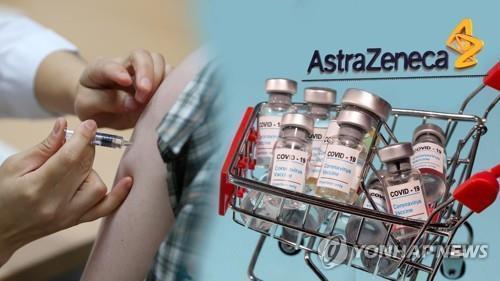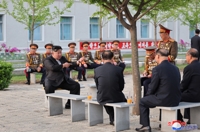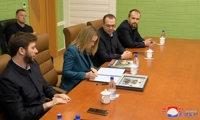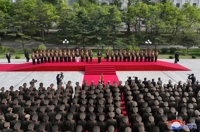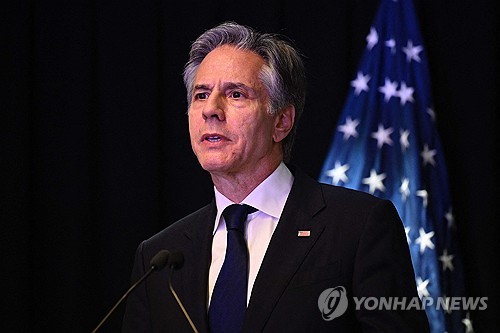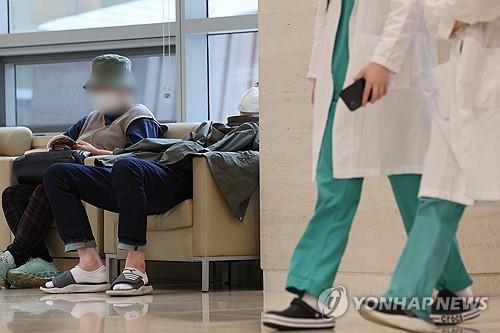S. Korea accelerates AstraZeneca vaccine rollout on EU regulator's decision
By Kim Han-joo
SEOUL, March 19 (Yonhap) -- South Korea may speed up the rollout of the AstraZeneca COVID-19 vaccine as the European Union's medicines regulator assessed that there is no link to blood clots found in some recipients.
The European Medicines Agency (EMA) announced Friday that there is no evidence suggesting a correlation between vaccines manufactured by British-Swedish pharmaceutical giant AstraZeneca and Oxford University and reports of blood clots.
More than a dozen European countries, including Germany, France and Italy, have suspended the use of AstraZeneca's vaccine pending the outcome of investigations into blood clots in a small number of people who had received it.
The EMA noted the vaccine may be associated with blood clots in some "very rare cases," but said its benefits outweighed the risk of possible side effects.
"The benefits of the vaccine in combating the still widespread threat of COVID-19 (which itself results in clotting problems and may be fatal) continue to outweigh the risk of side effects," it said, concluding what it called its "preliminary review."
"The vaccine is not associated with an increase in the overall risk of blood clots (thromboembolic events) in those who receive it," it added.
The agency noted the vaccine may be associated with "very rare cases" of blood clots.
"However, the vaccine may be associated with very rare cases of blood clots associated with thrombocytopenia, i.e. low levels of blood platelets (elements in the blood that help it to clot) with or without bleeding, including rare cases of clots in the vessels draining blood from the brain (CVST)," it said.
The EMA said it reviewed seven cases of blood clots and 18 cases of CVST, or cerebral venous sinus thrombosis, among around 20 million people in Britain who had received AstraZeneca vaccines as of Tuesday.
"A causal link with the vaccine is not proven, but is possible and deserves further analysis," it said.
The Korea Disease Control and Prevention Agency (KDCA) said earlier that the country will proceed with the inoculation plan with the AstraZeneca vaccine, although it said it would closely monitor the EMA's assessment.
International regulators have also said there is no proven evidence that the shots are related to the blood clots. The World Health Organization said the risk of hospitalization and death outweigh the risks of possible side effects.
South Korea has reported two suspected cases of blood clots related to the AstraZeneca vaccine, the KDCA said. One of the patients died, with authorities saying the death is highly likely to have been caused by other underlying diseases.
A man in his 20s was reported to have suffered from blood clots after receiving the AstraZeneca COVID-19 vaccine, the KDCA said. The man is in stable condition at a hospital.
Earlier, South Korea decided to expand the use of AstraZeneca's COVID-19 vaccine to people age 65 and older to ramp up the nationwide vaccination campaign as new overseas studies showed its effectiveness.
An accumulated 641,331 people were administered with their first shots as of midnight, which accounts for 1.23 percent of the country's 52 million population, the KDCA said.
Of the total, 598,353 health care workers and patients at long-term care facilities received the first jabs of the two-dose vaccine regimen developed by AstraZeneca, the KDCA said.
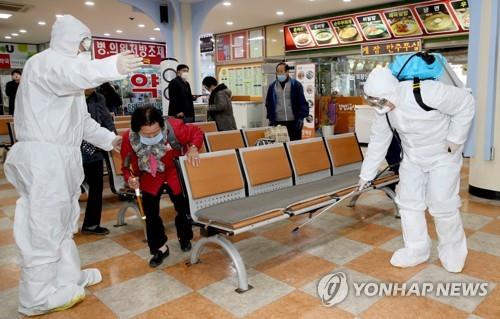
Health officials disinfect a public bus terminal in Taean, 144 kilometers southwest of Seoul, to prevent COVID-19 from spreading on March 18, 2021, in this photo provided by the county government. (PHOTO NOT FOR SALE) (Yonhap)
AstraZeneca's vaccine is among the cheapest available and considered to be easier to transport and store than rivals such as Pfizer's vaccine, which requires ultra-cold storage.
The authorities earlier said AstraZeneca vaccines for another 1.05 million people under the World Health Organization's global vaccine COVAX Facility project will arrive in the country in April.
On Thursday, the country reported 445 more COVID-19 cases, with the number remaining in the 400s for a second straight day, the KDCA said. The total caseload increased to 97,294.
khj@yna.co.kr
(END)
-
 'Queen of Tears' weaves rich tapestry of Korean contemporary art
'Queen of Tears' weaves rich tapestry of Korean contemporary art -
 Ateez member Yunho throws first pitch at MLB match between Dodgers, Mets
Ateez member Yunho throws first pitch at MLB match between Dodgers, Mets -
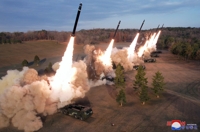 N. Korea says Kim guided simulated nuclear counterattack drills for 1st time
N. Korea says Kim guided simulated nuclear counterattack drills for 1st time -
 N. Korea calls envisioned U.S. aid to Ukraine 'hallucinogen'
N. Korea calls envisioned U.S. aid to Ukraine 'hallucinogen' -
 N. Korea calls on party propaganda officials to work harder
N. Korea calls on party propaganda officials to work harder
-
 'Queen of Tears' weaves rich tapestry of Korean contemporary art
'Queen of Tears' weaves rich tapestry of Korean contemporary art -
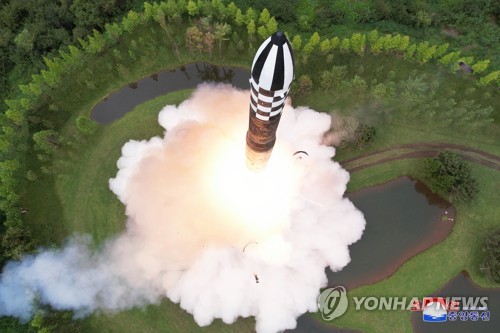 Experts see possibility of N.K. conducting nuclear test before U.S. presidential vote
Experts see possibility of N.K. conducting nuclear test before U.S. presidential vote -
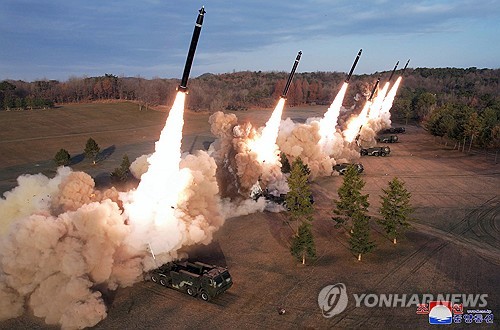 N. Korea says Kim guided simulated nuclear counterattack drills for 1st time
N. Korea says Kim guided simulated nuclear counterattack drills for 1st time -
 Looming weekly closure of major hospitals feared to worsen medical service crisis
Looming weekly closure of major hospitals feared to worsen medical service crisis -
 N. Korea calls envisioned U.S. aid to Ukraine 'hallucinogen'
N. Korea calls envisioned U.S. aid to Ukraine 'hallucinogen'
-
 Indonesia coach left with mixed feelings after eliminating native S. Korea in Olympic football qualifiers
Indonesia coach left with mixed feelings after eliminating native S. Korea in Olympic football qualifiers -
 S. Korea eliminated in Olympic football qualifiers as poor defense, undisciplined play prove costly
S. Korea eliminated in Olympic football qualifiers as poor defense, undisciplined play prove costly -
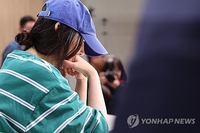 ADOR CEO calls conflict with Hybe 'worst experience of my life'
ADOR CEO calls conflict with Hybe 'worst experience of my life' -
 (LEAD) 10-man S. Korea lose to Indonesia to miss out on Paris Olympic football qualification
(LEAD) 10-man S. Korea lose to Indonesia to miss out on Paris Olympic football qualification -
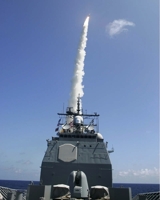 S. Korea to acquire SM-3 shipborne missiles by 2030
S. Korea to acquire SM-3 shipborne missiles by 2030

